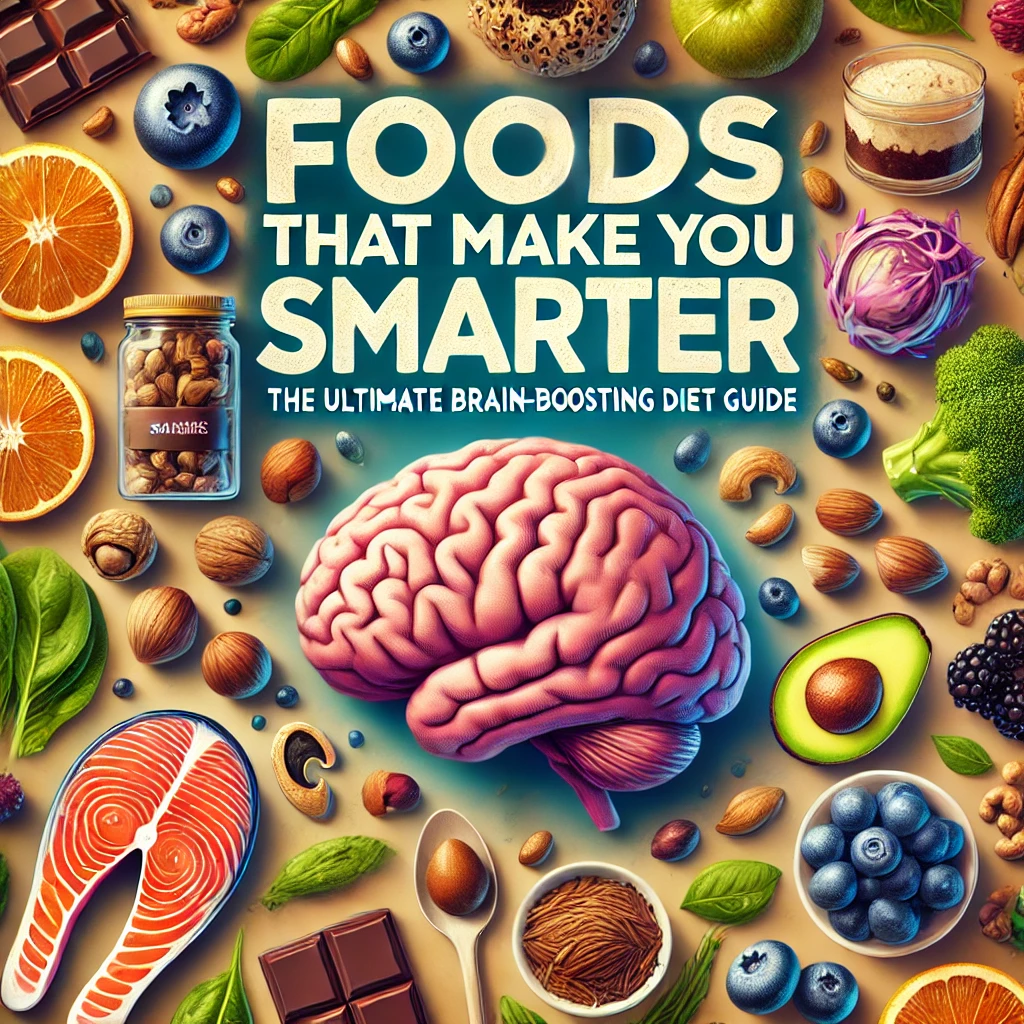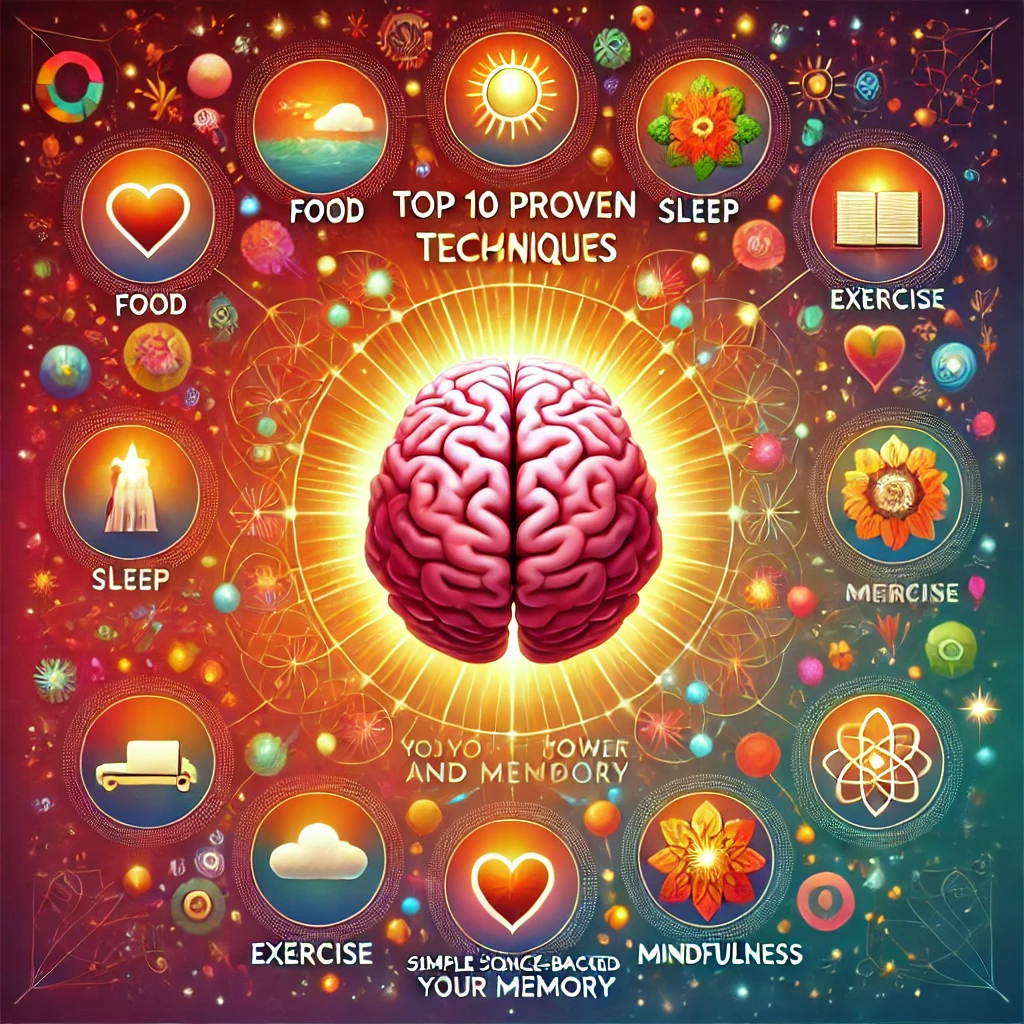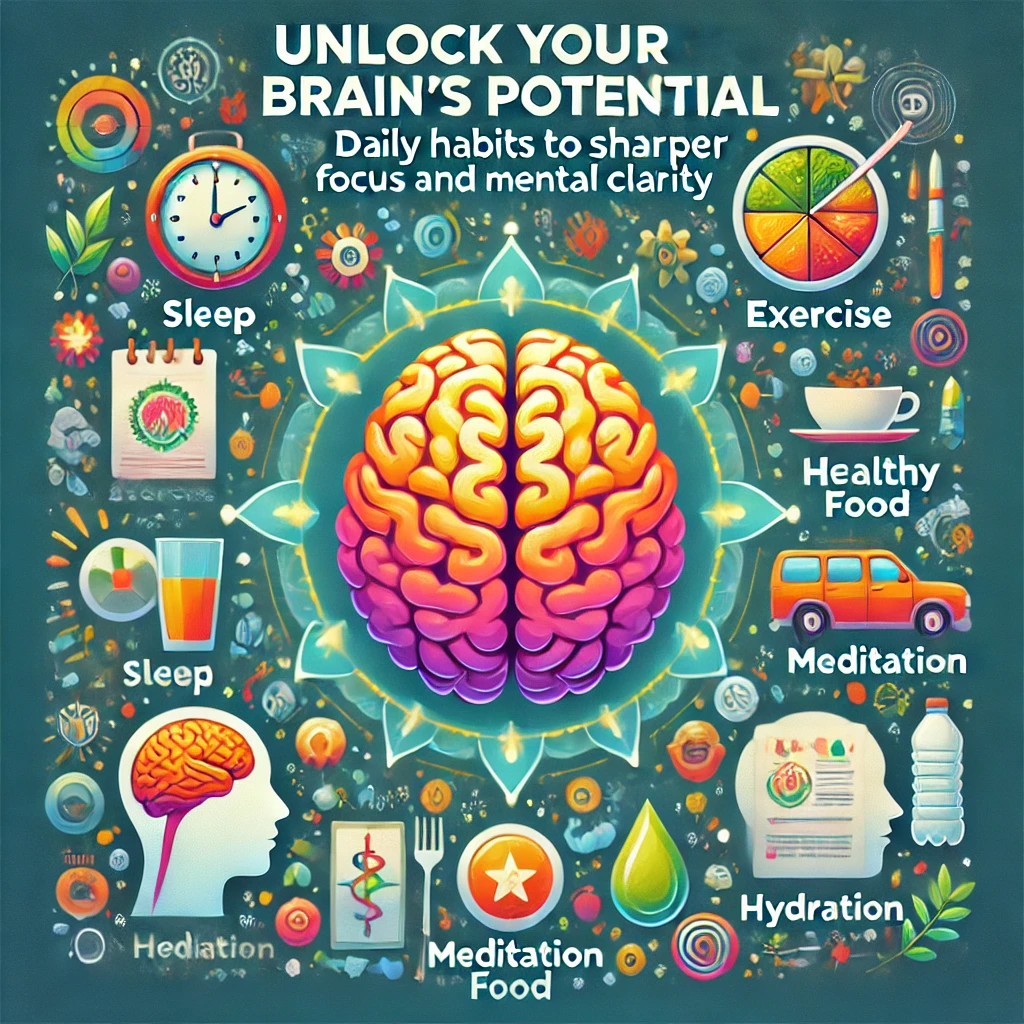Introduction
Have you ever noticed how some days you feel sharp and focused, while on others, you’re sluggish and forgetful? You might be surprised to learn that the food you eat plays a huge role in how well your brain functions. A balanced diet doesn’t just affect physical health; it can also significantly impact your mental clarity, memory, and focus.
In this ultimate brain-boosting diet guide, we’ll dive into the best foods for memory, mental clarity, and overall cognitive health. From superfoods for brain power to practical diet tips, here’s everything you need to know to fuel your brain and stay sharp.
1. Fatty Fish: Omega-3 Powerhouse for Brain Health
Fatty fish, like salmon, trout, and sardines, are packed with omega-3 fatty acids. These essential fats are crucial for brain health and can even help prevent cognitive decline as you age. Your brain is made up of about 60% fat, and half of that fat is omega-3s. This means that eating foods rich in omega-3s literally nourishes your brain.
Relatable anecdote:
I used to avoid fish because I thought it was too “fishy.” But once I tried salmon with a little lemon and herbs, I was hooked. Not only did I feel more focused after adding it to my diet, but I also noticed that my memory seemed sharper.
How to add fatty fish to your diet:
- Enjoy salmon grilled with a side of vegetables.
- Try sardines on whole-grain toast for a quick brain-boosting snack.
- Make a tuna salad with leafy greens for a nutritious lunch.
2. Blueberries: Small Berries with Big Benefits
Blueberries are one of the most effective foods for mental clarity, thanks to their high antioxidant content. Antioxidants help fight oxidative stress, which can contribute to aging and neurodegenerative diseases. Some studies suggest that blueberries improve communication between brain cells and may even delay brain aging.
Example:
Think of antioxidants as bodyguards for your brain cells, protecting them from harm. Eating blueberries is like sending in reinforcements to keep your brain in tip-top shape.
Easy ways to enjoy blueberries:
- Add a handful of blueberries to your morning oatmeal or smoothie.
- Keep dried blueberries on hand for a healthy snack.
- Use fresh blueberries as a topping on Greek yogurt for an extra brain boost.
3. Turmeric: The Golden Spice for Mental Clarity
Turmeric, especially in the form of curcumin, is an incredible brain-boosting food. Curcumin is a natural anti-inflammatory and antioxidant, helping to support brain health and improve cognitive function. It’s even been shown to cross the blood-brain barrier, which means it can directly benefit brain cells.
Relatable anecdote:
When I first started using turmeric, I just added a dash to my scrambled eggs. Over time, I noticed a subtle improvement in my focus and mood. Now, turmeric lattes are a staple in my morning routine.
How to include turmeric in your diet:
- Make a golden turmeric latte with almond milk and honey.
- Add a pinch of turmeric to soups, stews, and rice dishes.
- Blend turmeric into smoothies for an extra health kick.
4. Leafy Greens: Nutrient-Packed for Cognitive Function
Leafy greens like spinach, kale, and Swiss chard are loaded with brain-boosting nutrients, including vitamin K, folate, and beta carotene. These nutrients are known to support brain health and may help slow cognitive decline. Leafy greens also provide antioxidants, making them one of the best foods for memory and long-term brain health.
Example:
Imagine your brain as a computer. Leafy greens are like the “antivirus software” that helps keep it running smoothly and protects it from “viruses” (aka aging and decline).
Easy ways to get more leafy greens:
- Toss spinach into your morning smoothie for a nutrient boost.
- Add kale to salads, soups, or stir-fries.
- Try collard greens or Swiss chard as a healthy side dish.
5. Pumpkin Seeds: Tiny Seeds, Big Brain Benefits
Pumpkin seeds might be small, but they’re packed with brain-friendly nutrients like magnesium, iron, zinc, and copper. Magnesium, in particular, is crucial for learning and memory. Low magnesium levels are often linked to cognitive issues, making pumpkin seeds a top choice for brain health.
Relatable anecdote:
I started keeping a jar of pumpkin seeds on my desk, and it’s been a game-changer. Snacking on them not only keeps hunger at bay but also gives me a noticeable mental boost.
How to enjoy pumpkin seeds:
- Sprinkle pumpkin seeds on salads or soups.
- Add them to yogurt or oatmeal for extra crunch.
- Eat a handful as a satisfying snack between meals.
6. Oranges: Vitamin C for Brain Protection
Oranges are one of the most accessible and enjoyable foods to improve focus and protect brain health. One medium orange provides all the vitamin C you need in a day, which is essential for preventing cognitive decline. Vitamin C acts as a powerful antioxidant, shielding your brain cells from damage.
Example:
Think of vitamin C as a protective shield for your brain. With enough of it, you can fend off harmful invaders like free radicals that threaten brain health.
How to incorporate more oranges:
- Drink a glass of fresh orange juice with breakfast.
- Add orange slices to salads for a zesty twist.
- Enjoy an orange as a refreshing mid-day snack.
7. Dark Chocolate: A Delicious Way to Boost Your Brain
Good news for chocolate lovers! Dark chocolate is rich in flavonoids, caffeine, and antioxidants, making it an excellent brain-boosting food. Flavonoids help enhance memory and improve cognitive function, while the caffeine in dark chocolate can improve focus and mental clarity.
Relatable anecdote:
I used to feel guilty about my afternoon chocolate fix, but once I switched to dark chocolate, I realized it actually helped me focus. Now, it’s my little treat that comes with brain benefits.
Ways to enjoy dark chocolate:
- Have a small piece of dark chocolate as an afternoon pick-me-up.
- Add cocoa powder to smoothies or oatmeal.
- Make a dark chocolate and nut trail mix for a healthy snack.
8. Walnuts: Brain-Shaped Nuts for Brain Power
Walnuts are often called “brain food,” and for good reason. These nuts are high in DHA, a type of omega-3 fatty acid, which has been linked to improved cognitive function. Walnuts are also rich in antioxidants and anti-inflammatory compounds, making them one of the best foods for memory and overall brain health.
Example:
It’s almost poetic that walnuts are shaped like little brains—they’re packed with nutrients that directly support brain function.
How to include walnuts in your diet:
- Sprinkle walnuts on salads or yogurt.
- Blend them into smoothies for a nutty flavor.
- Snack on a handful of walnuts for an energy boost.
9. Green Tea: Focus and Relaxation in One Sip
Green tea contains caffeine, which helps improve focus, as well as L-theanine, an amino acid that promotes relaxation without drowsiness. This combination makes green tea perfect for supporting focus and cognitive function. It’s one of the top brain-boosting foods for those who need a natural way to stay alert.
Relatable anecdote:
I switched from coffee to green tea a few years ago, and it’s been life-changing. The caffeine boost is subtle but steady, and I feel focused without the jitters.
How to enjoy green tea:
- Sip on a cup of green tea in the morning or afternoon.
- Try matcha, a powdered form of green tea, for an extra antioxidant boost.
- Add a slice of lemon to your green tea for a refreshing twist.
10. Eggs: Nutrient-Packed for Mental Clarity
Eggs are rich in several brain-boosting nutrients, especially choline, which is crucial for brain development and memory. Choline helps produce acetylcholine, a neurotransmitter involved in memory and mood regulation. Eggs also provide B vitamins, which help slow cognitive decline.
Example:
Think of choline as a “memory booster” that helps keep your mind sharp. Eating eggs regularly gives your brain the fuel it needs to function at its best.
Easy ways to eat more eggs:
- Enjoy scrambled eggs with spinach and tomatoes.
- Make a vegetable omelet for breakfast.
- Hard-boil eggs for a quick, protein-packed snack.
Conclusion
Eating for brain health doesn’t have to be complicated. By including these superfoods for brain power in your diet, you can support your memory, mental clarity, and overall cognitive function. Remember, a balanced diet for brain health is about consistency—small changes can make a big difference over time.
Next time you’re at the grocery store, consider adding these brain-boosting foods to your cart. From fatty fish to dark chocolate, these delicious options can help you feel sharper, more focused, and ready to tackle whatever comes your way.
FAQ Section
1. What are the best foods for memory?
Foods like blueberries, walnuts, and fatty fish are excellent for improving memory and cognitive function.
2. How does diet impact brain health?
The nutrients in your diet directly affect brain function. Foods rich in antioxidants, omega-3s, and vitamins can protect the brain and improve focus and memory.
3. Can dark chocolate really improve brain function?
Yes! Dark chocolate contains antioxidants and flavonoids that support brain health
, while the caffeine can improve focus and alertness.
4. How much fatty fish should I eat for brain health?
Aim to eat fatty fish, like salmon or sardines, 1-2 times a week to get enough brain-boosting omega-3s.
5. Are there specific vitamins for cognitive function?
Yes, vitamins like B6, B12, and folate are known to support brain health and cognitive function.
6. How do antioxidants help the brain?
Antioxidants protect brain cells from oxidative stress, which can slow down cognitive decline and improve mental clarity.
7. Can I drink coffee for focus, or is green tea better?
Both coffee and green tea can improve focus, but green tea also contains L-theanine, which promotes relaxation, making it a good option for sustained focus.
8. Is it possible to eat too many brain-boosting foods?
While these foods are healthy, it’s essential to maintain a balanced diet. Variety and moderation are key.
9. What’s a good daily brain-boosting snack?
A handful of walnuts or pumpkin seeds, a piece of dark chocolate, or a cup of green tea are all excellent snacks for brain health.
These FAQs provide answers to common questions about brain-boosting foods, adding valuable insights for readers interested in maximizing their cognitive health.



